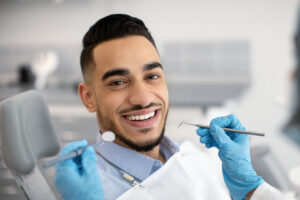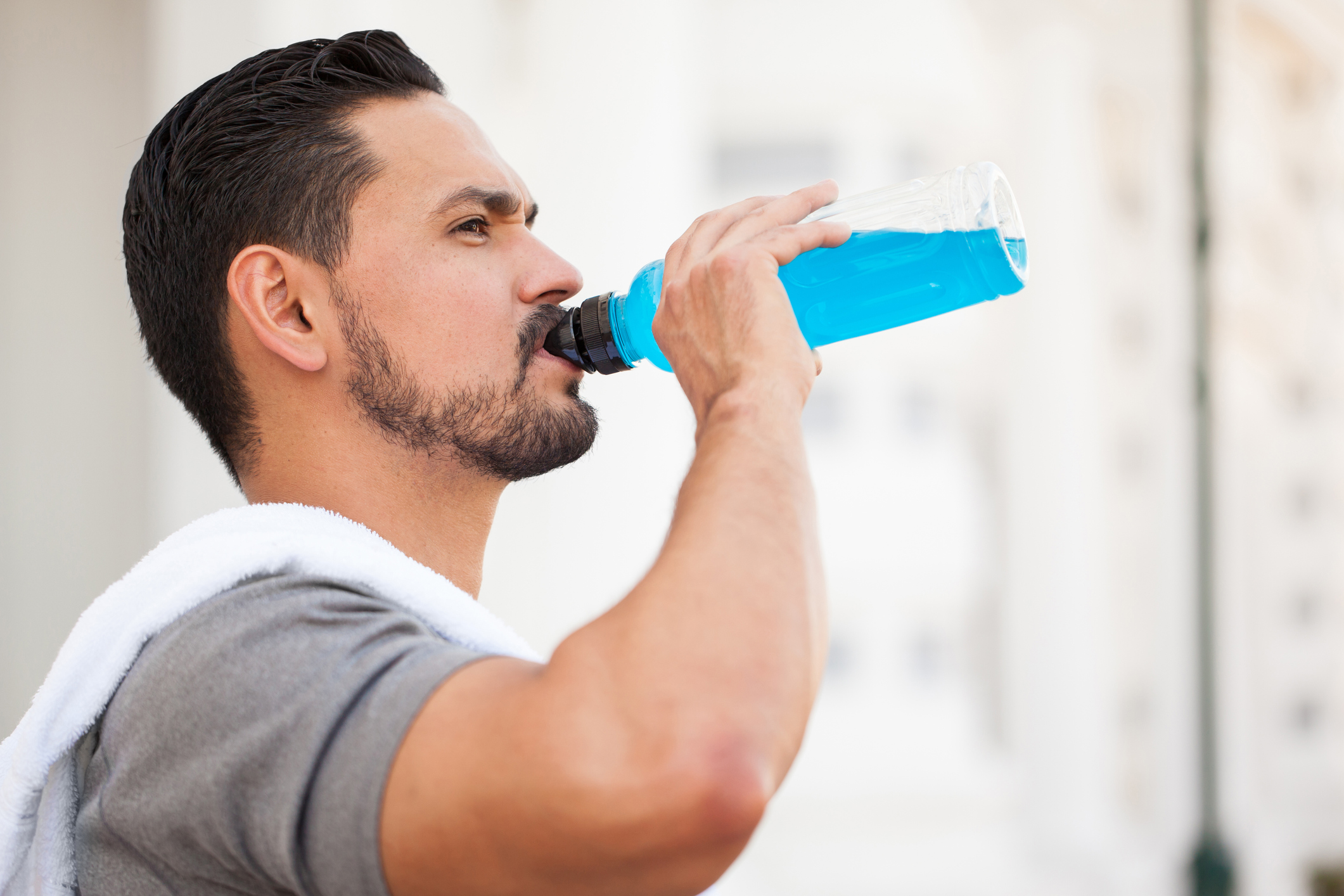-
A Guide to Understanding Dental Insurance

Man using his dental benefits to visit dentist
Understanding Dental Insurance
Dental insurance is a critical component of healthcare that often goes underappreciated until the need arises for routine cleanings, unexpected fillings, or more significant procedures like crowns and bridges. Understanding the intricacies of dental insurance can save you from unexpected expenses and help you maximize the benefits you’re entitled to. This guide, drawing from a comprehensive overview of dental insurance basics, aims to clarify the subject and provide practical advice for navigating dental insurance plans effectively.
Understanding the Basics
Dental insurance functions similarly to health insurance but is specifically designed to cover dental care. Plans typically cover preventive services such as exams and cleanings, basic procedures like fillings, and more complex treatments including root canals and crowns. Understanding your plan’s structure—monthly premiums, annual maximums, deductibles, and copays or coinsurance—is essential for making informed decisions about your dental care.
Key Terms Explained
Navigating dental insurance requires familiarity with several key terms:
In-Network vs. Out-of-Network: Choosing in-network providers can significantly reduce out-of-pocket costs, thanks to negotiated rates.
Coverage Tiers: Dental services are often categorized into preventive, basic, and major services, each with varying levels of coverage.
Waiting Periods: Some plans impose waiting periods before certain benefits can be utilized, affecting when you can receive specific treatments.
Maximizing Your Benefits
To get the most out of your dental insurance:
Stay In-Network: Opt for providers within your plan’s network to enjoy lower rates.
Regular Preventive Care: Leverage your plan’s coverage for preventive care to maintain oral health and detect issues early.
Understand Your Plan: Familiarize yourself with the details of your coverage, including limitations and exclusions, to avoid surprises.
Choosing the Right Plan
Picking the right dental insurance plan requires consideration of your dental health needs, budget, and the plan’s coverage specifics. Plans vary in terms of monthly premiums, deductibles, annual maximums, and coverage details for different types of dental care. Whether it’s a PPO, which offers flexibility in choosing providers, or a DMO, which typically offers lower costs but requires you to stay within a network, understanding the differences is crucial.
Practical Considerations
Costs: Dental insurance can significantly reduce out-of-pocket expenses for dental care, but it’s important to compare the costs of premiums against potential out-of-pocket savings.
Eligibility: Dental insurance is accessible to individuals regardless of employment status, with options available for students, part-time workers, and those in transition.
Timing: Unlike health insurance, dental insurance can often be purchased at any time, providing flexibility for those needing immediate coverage.
Stay Informed
A thorough understanding of dental insurance not only helps in selecting the right plan but also ensures that you can make the most of your benefits while minimizing out-of-pocket expenses. Regular reviews of your dental insurance plan, staying informed about the coverage and exclusions, and making strategic decisions about dental care can lead to significant savings and a healthier smile.
Park 56 Dental is here for you in New York, delivering top-quality care since 1997. Our expert team offers a wide range of treatments from pediatric to sedation dentistry, ensuring personalized care for every patient. Experience the difference with a complimentary consultation where we’ll address your sensitivity concerns and guide you toward the best treatment options. Enjoy a comfortable dental visit with our modern practice and diverse insurance plan acceptance. Schedule with us today online or at 646-679-3973 and take the first step toward tackling tooth sensitivity with confidence!
-
Can Sports Drinks Rot Your Teeth?

Man drinking sports drink.
A refreshing sports drink might feel like the perfect way to replenish your electrolytes after an intense workout, but have you considered the toll it takes on your oral health? A mounting body of evidence suggests that sports drinks contribute to dental problems, including tooth decay and erosion. Three problematic ingredients found in these beverages include citric acid, sugar, and artificial sweeteners.
The Problems with Citric Acid
Citric acid wreaks havoc on your teeth without your knowledge. As the name suggests, citric acid raises the acidity level in your mouth, compromising the outer layer of your teeth called the enamel. Once the enamel erodes, your teeth become more susceptible to stains and cavities. But that’s not all—citric acid is also known to cause gum inflammation, leading to more serious gum disease if not treated promptly.
The Not-So-Sweet Side of Sugar
Sugar is another common ingredient in sports drinks, which is notoriously linked to dental problems. Unfortunately, sugar feeds the harmful bacteria in your mouth. These bacteria feast on sugar, producing an acidic byproduct that eats away at your enamel. This process leads to cavities and, eventually, rotten teeth.
The Downsides of Artificial Sweeteners
Many sports drink manufacturers claim their products are healthier because they contain artificial sweeteners instead of sugar. While these sweeteners might not directly contribute to tooth decay as sugar does, they can still cause problems. In some people, artificial sweeteners can trigger tooth sensitivities and other dental problems, making them a less-than-ideal choice for good oral health.
Healthier Alternatives to Sports Drinks
Fortunately, quenching your thirst and replenishing your body post-workout doesn’t have to compromise dental health. Consider these viable alternatives:
- Plain water is the best way to hydrate without risking your dental health.
- Coconut water is an excellent natural source of electrolytes, making it a great way to hydrate and refresh without harmful additives.
- Homemade electrolyte drinks are easy to make. Simply mix water with a pinch of salt and a squeeze of lemon for a fast, effective electrolyte drink.
- Iced green tea is packed with antioxidants. Choose the unsweetened variety for a refreshing drink that’s good for your oral health.
- Water sweetened with fruit provides a natural and healthy flavor.
- Carbonated flavored water delivers fizzy satisfaction without added sugar and acid.
- Milk is a surprising source of natural electrolytes. Just avoid flavored or sweetened varieties containing added sugar.
Why Choose Park 56 Dental?
Good dental health requires regular check-ups and cleanings to catch issues early. This is where Park 56 Dental comes in. Our spa-like office caters to a clientele that appreciates personalized, quality dental care. With services ranging from general and cosmetic dentistry to sedation solutions and emergency dental care, we’re prepared to help you smile with confidence. We take pride in treating each patient individually and have been honored with the title of top New York dentist, serving the 10022 zip code since 1997.
Remember, good oral health isn’t just about picking the right drinks—it’s about having the right dental care provider by your side. Contact Park 56 Dental today at (212) 826-2322 for top-notch dental services in NYC.
-
How Your Oral Health Affects Your Mental Health

Your oral health is important for more than just your teeth and gums. It can also affect your mental health. Poor oral health can make your mental health worse. For example, if you have gum disease, you may be more likely to develop depression. And if you have tooth pain, it can lead to anxiety and stress. Read on to learn the ways that your oral health can affect your mental health.
Gum Disease and Depression
Gum disease is an infection of the gums that can cause inflammation, bleeding, and pain. If you have gum disease, you may be more likely to develop depression. This is because the inflammation from gum disease can affect the brain’s chemistry and increase the levels of stress hormones in the body.
Tooth Pain and Anxiety
Tooth pain is a common problem that can lead to anxiety and stress. If you have tooth pain, it can be difficult to concentrate on work or other activities. And the pain can make it hard to get a good night’s sleep. This can lead to fatigue and irritability.
Bad Breath and Social Anxiety
Bad breath (halitosis) is another oral health problem that can cause social anxiety. If you’re worried about your breath, you may avoid social situations where you have to talk to people. This can affect your work, school, and personal relationships.
If you’re experiencing any of these problems, it’s important to see a dentist or other healthcare provider. They can help you manage your oral health and treat any problems that you may have.
Poor Oral Health and Sleep Problems
There is a strong connection between oral health and sleep quality. Poor oral health can lead to sleep problems, which can in turn worsen mental health symptoms.
Poor oral hygiene can cause gum disease, which can lead to inflammation and pain. This can make it difficult to get a good night’s sleep. In addition, tooth pain can also disrupt sleep.
Sleep deprivation can worsen mental health conditions such as depression and anxiety. It can also make it difficult to concentrate and make good decisions. Poor sleep can also lead to irritability and moodiness.
If you are struggling with your mental health, it is important to take care of your oral health. Be sure to brush and floss regularly, and see your dentist
Oral Health and Self-Esteem
It’s no secret that your oral health can have a big impact on your confidence and self-esteem. If you’re not happy with the way your teeth look, it can be hard to feel good about yourself when you smile or talk.
What to Do
There are a few ways that you can improve your oral health and reduce the impact it has on your mental health:
- Make sure to brush and floss your teeth regularly. This will help to remove plaque and bacteria from your mouth, which can cause infections.
- Visit your dentist regularly for checkups and cleanings. This will help to identify any problems early on and prevent them from getting worse.
- Eat a healthy diet and avoid sugary drinks. This will help to keep your teeth healthy and strong.
If you are struggling with your oral health, make sure to talk to a dentist at Park 56 Dental in New York. Our team can help you find the best way to improve your oral health and reduce the impact it has on your mental health.
-
Foods and Drinks that Erode Teeth

You try to stick to a healthy diet, avoiding sugary sodas and sticky candies that can damage your teeth. However, sometimes even healthy foods can cause tooth erosion. It pays to be mindful of the signs of eroded tooth enamel and avoid foods that can negatively impact the health of your teeth.
First, what are the symptoms of tooth enamel erosion? You might notice that your teeth feel sensitive when you eat or drink something hot or cold. You might also notice that your fillings or even your teeth have changed color. If your enamel erodes to an extreme degree, you might lose a tooth or develop an abscess. So, what foods should you avoid to prevent these problems?
- Citrus Fruit: The high acid content in citrus can damage your teeth. In fact, even things with citrus flavoring can wear down your enamel.
- Tomatoes: Tomatoes are good for your body, but they can be rough on your teeth. This is because they’re acidic. If you eat tomato sauce on pasta, you’re doing your teeth a double disservice, because the tomatoes break down your enamel and the carbs in pasta feed cavity-causing bacteria.
- Dried Fruits: Even though it’s nutrient-dense, dried fruit can damage your teeth. It’s sticky, and has sugar, so if you don’t immediately get all that sticky fruit off of your teeth, the sugar will erode your enamel.
- Carbonated Beverages: Even when they’re sugar free, soft drinks have carbonation that can wear away your enamel. You’re better off with unsweetened tea or water, but if you do drink soft drinks, don’t brush immediately. You might think that cleaning the soda off of your teeth immediately is a good idea, but brushing after your enamel has been weakened by carbonation can erode it further.
- Pickles: Because of the acid required for the pickling process, pickles can cause staining and tooth erosion. Some pickles also have sugar, which makes them even more likely to cause cavities.
- Wine: Both white and red wine have enamel-softening acid, but red wine also contains compounds called tannins that can dry your mouth and stain your teeth.
- Sports Drinks: These beverages are high-carb, sugary, acidic, and thick enough to stick to your teeth.
- Crackers: Because they’re refined carbohydrates, crackers can cause inflammation in the body. Crackers also stick to your teeth, which can promote tooth decay.
- Sugar: Of course, you’ve known since childhood that sugar causes cavities. It’s important to note, however, that sugar isn’t only found in sweet treats, but also in processed foods.
At Park 56 Dental Group, we offer pediatric, prosthodontics, endodontics, oral surgery, Invisalign®, emergency, and sedation dentistry, all at the highest level of treatment. We serve the Midtown, Central Park, Upper East Side, Park Avenue, and all surrounding Manhattan and New York areas, with a patient-centered practice that has hours to fit your schedule. Schedule your complimentary consultation today by contacting us online or calling us at (212) 826-2322.
RECENT POSTS
categories
- Uncategorized
- Cosmetic Dentistry
- Veneers
- Healthier Teeth
- Teeth Whitening
- Dental Health
- Video
- Dental Emergencies
- Invisalign
- Dental Implants
- Root Canal
- Sedation Dentistry
- Infographic
- Dental Crowns and Bridges
- Dental Anxiety
- Gum Disease
- COVID-19
- Bad Breath
- New York Dentist
- Cut out sugar
- General Dentistry
- Oral Health
- Oral Cancer
- Dry Mouth
- Gum Health
- Toothache
- Dental Sealants
- Cavities
